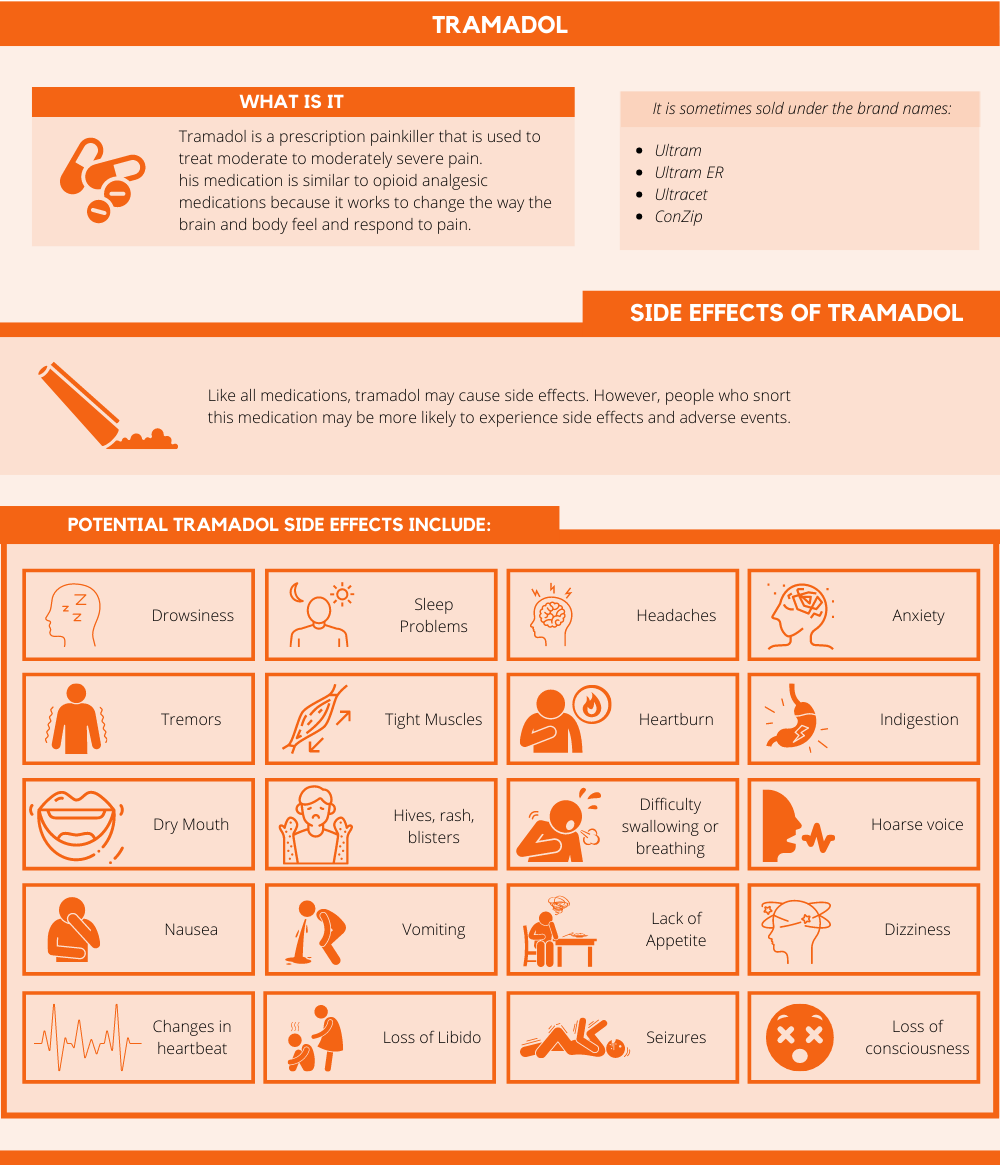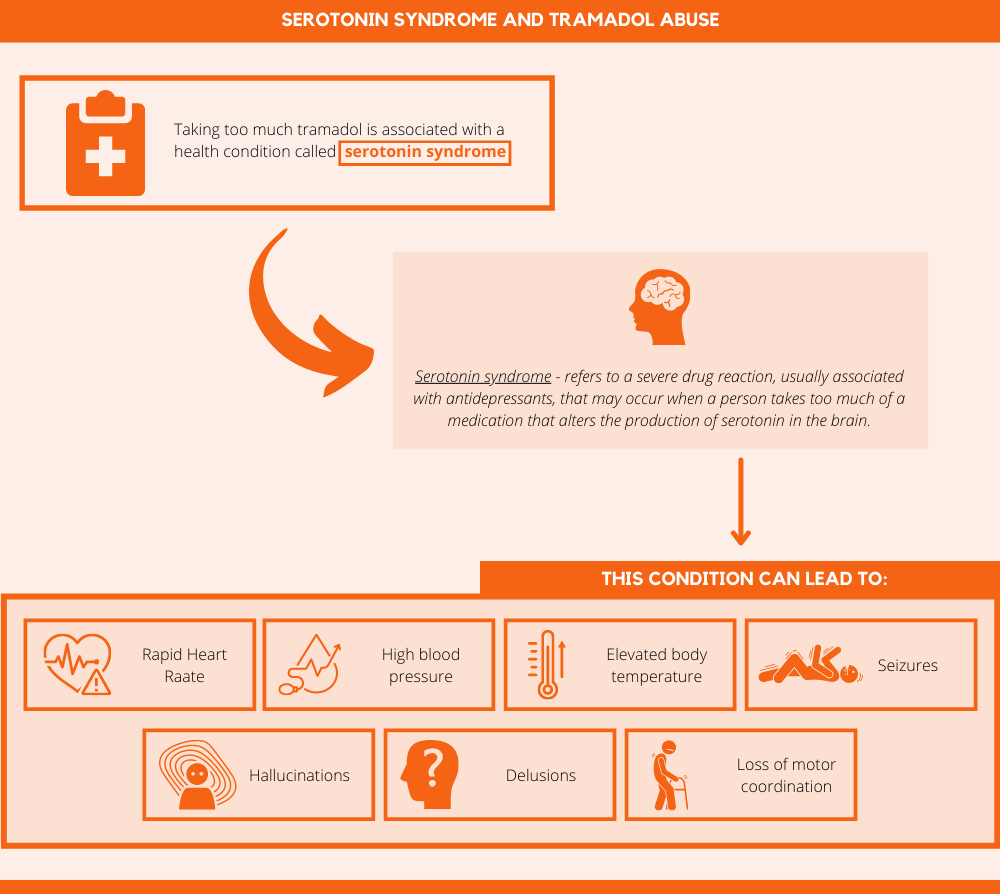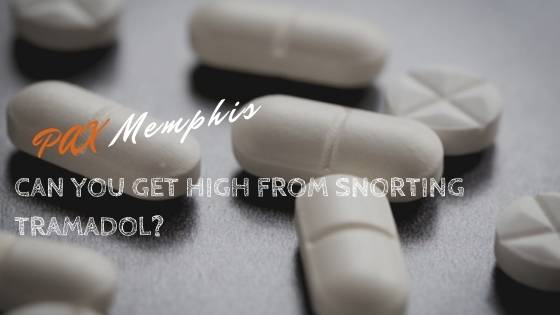Tramadol is a synthetic prescription painkiller that works in similar ways as opioids do. Being similar to opioids, many people will crush and snort this medication in an attempt to get high. Snorting tramadol is dangerous, potentially deadly, and probably won’t get you any higher than it would from swallowing it. Instead, crushing and snorting this medication can increase your risk of addiction, overdose, and respiratory damage.
What is Tramadol?
Tramadol is a prescription painkiller that is used to treat moderate to moderately severe pain. It is sometimes sold under the brand names Ultram, Ultram ER, Ultracet, and ConZip. This medication is similar to opioid analgesic medications because it works to change the way the brain and body feel and respond to pain.
Tramadol comes in the form of a tablet, a liquid solution, an extended-release tablet, and an extended-release capsule. The capsules, tablets, and liquid are all meant to be taken by mouth every 4 to 6 hours as needed for pain.[1]
Although it is thought to be less addictive than other opioids like oxycodone or hydrocodone, tramadol may still be habit-forming – particularly in people who use this medication long-term. Additionally, people who take this medication long-term should speak with their doctor before stopping use of the drug as it may cause withdrawal symptoms.

Can Snorting Tramadol Get You High?
As an opioid medication, some people will abuse tramadol to get high. One way they will do this is by snorting the medication.
When tramadol is taken as prescribed, it is generally safe to use and less addictive than other opioids. Crushing and snorting the medication, however, is extremely unsafe.
The reason why people crush and snort pills is to obtain a faster and more intense high. This is because snorting medications allows them to reach the bloodstream faster than they would if a person were to swallow them.
With that said, there is little evidence that snorting tramadol produces a more intense high than swallowing it does. The only difference may be that the mucous membrane of the nasal passages absorb the drug faster, delivering it to the blood and the brain faster, and producing more instant effects.
Crushing and snorting this medication can be much riskier and more deadly than swallowing it. It can also increase the risk for addiction, overdose, and death.
Tramadol Side Effects
Like all medications, tramadol may cause side effects. However, people who snort this medication may be more likely to experience side effects and adverse events.
Potential tramadol side effects include:[1]
- Drowsiness
- Difficulty staying asleep or falling asleep
- Headaches
- Anxiety
- Uncontrollable shaking of a body part
- Tight muscles
- Mood swings
- Heartburn/indigestion
- Dry mouth
- Hives, rash, blisters
- Difficulty swallowing or breathing
- Hoarse voice
- Nausea, vomiting, lack of appetite
- Dizziness
- Changes in heartbeat
- Loss of sexual desire
- Seizures
- Loss of consciousness
Risks and Dangers of Snorting Tramadol
When someone snorts tramadol, they may feel a burning sensation in their nose. While this feeling may subside in time, there are other more long-term dangers and risks associated with tramadol insufflation.
Repeated intranasal use of tramadol can lead to permanent damage to the nose and nasal passages. This is because crushing and snorting pills can damage the delicate tissue that lines the inside of the nose. When this tissue becomes damaged, a person can lose their sense of smell or have difficulty breathing. They may even develop a deviated septum or notice a whistling noise coming from their nose when they breathe.
Certain tramadol pills are extended-release formulations. Snorting extended-release tramadol makes it easy to ingest too much of the drug at once. When swallowed, they slowly absorb into the body over time. When snorted, however, a higher dose of the drug is delivered to the body at once, increasing the risk of overdose.
Other potential dangers associated with snorting tramadol include:
- Bloody nose
- Respiratory infections
- Muscle and joint pain
- Itchiness on the body
- Sweating
- Rash
- Diarrhea
- Rapid weight gain or loss
- Severe headaches
- Mental confusion
- Loss of coordination
- Feelings of depression or anxiety
- Developing a physical dependence on tramadol
Serotonin Syndrome and Tramadol Abuse

Taking too much tramadol is associated with a health condition called serotonin syndrome. Serotonin syndrome refers to a severe drug reaction, usually associated with antidepressants, that may occur when a person takes too much of a medication that alters the production of serotonin in the brain.[2]
This condition can lead to:
- Rapid heart rate
- High blood pressure
- Elevated body temperature
- Seizures
- Hallucinations
- Delusions
- Loss of motor coordination
Find Help Today
If you or someone you love has been snorting tramadol, it’s time to seek professional help. There are many options out there for tramadol addiction treatment.
First, most individuals will need to detox. Since detox can be painful, it’s best to do so in a medically-supervised setting.
After detox, patients can move into inpatient rehab where they will learn how to cope with their emotions, manage cravings, and live a sober life. To find a rehab program near you or to learn more about addiction treatment at PAX Memphis, pick up the phone and call us today.
References:
Medically Reviewed: September 25, 2019

All of the information on this page has been reviewed and verified by a certified addiction professional.










